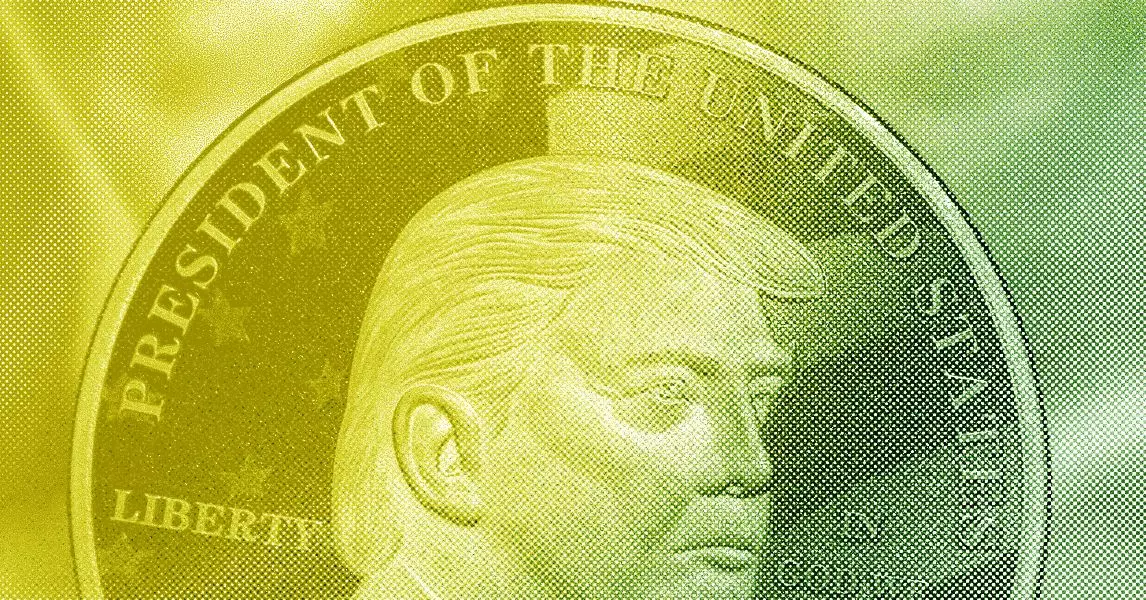In recent years, the phenomenon of cryptocurrency has evolved from a niche interest among tech enthusiasts to a mainstream topic of discussion, especially in political contexts. One of the more troubling examples of this intersection is former President Donald Trump’s foray into cryptocurrency through his self-branded digital currency, TrumpCoin. Announced with grandiosity and a corresponding buzz, the launch culminated in a private dinner with significant investors, which raised eyebrows not only in financial sectors but also among ethical watchdogs. The implications of this venture expose the intricate web of conflicts of interest that arise when political figures engage in financial endeavors that directly affect their personal wealth and public office.
Trump’s announcement came at a curious time, sparking trading frenzies and inflating his net worth on paper. However, the ethical concerns stretch far beyond mere speculation in cryptocurrency markets. Critics have expressed alarm over the potential dangers of perceived corruption, where a sitting president may profit from companies that can influence or are influenced by federal policies. The underlying question emerges: Should the leader of a nation have the liberty to benefit financially from their political decisions? These questions underscore a dangerous precedent, suggesting a melding of investment and governance that blurs the lines of accountability and integrity.
From Skeptic to Pioneer: Trump’s Evolving Stance on Cryptocurrency
The biggest irony in Trump’s crypto saga is perhaps his earlier disdain for the industry. Just a couple of years back, he labeled bitcoin a “scam” and advocated for stringent regulations over its use. His transition from a vocal critic to an active player in the cryptocurrency arena raises eyebrows. It paints a picture of a man who molds his opinions based on convenience rather than conviction. The question arises: Is this adaptability a shrewd business tactic, or does it reflect a deeper moral ambiguity?
Moreover, the emergence of Trump’s own meme coin, shortly before his second-term inauguration, illustrates his talent for branding and capitalizing on trends. Meme coins, while often regarded as frivolous or speculative investments, have garnered immense popularity, attributed to community-driven momentum rather than intrinsic value. It is a curious yet revealing choice for a former president with a history of branding success.
Furthermore, the solidification of TrumpCoin as a significant player in the digital currency realm forces us to reckon with an essential aspect of cryptocurrency: its decentralized nature. Unlike traditional currencies, cryptocurrencies operate independent of government oversight, leading to both freedom and chaos within the markets. Trump’s engagement with this unpredictable landscape may well be a cyclical play; capitalize on the opportunities it presents while selectively promoting regulatory measures that align with his financial interests.
The Crypto Buzz: Understanding the Culture behind Digital Currency
As conversations about cryptocurrencies become entwined with politics, there is an undeniable culture that has developed around them—one that almost celebrates the notion of “HODL” (hold on for dear life). This language, though seemingly innocuous, exemplifies a mindset of relentless optimism often detached from the realities of investment risk. It fosters a community that can rally behind both absurdity and fervor, creating a vibrant market ripe for exploitation.
The undercurrent of this culture highlights the dissonance within the crypto community, forcing traditional financial doctrines into chaotic dynamics. It manifests the dichotomy between economic reality and fantasy, where the notion of a “meme coin” transcends mere digital currency, becoming a symbol of societal trends. The potential danger is the normalization of such approaches—what does it say about our values when a joke coin can secure significant financial backing and evoke passionate support?
The urgency for regulatory oversight becomes increasingly apparent as more political figures embrace this intoxicating blend of finance and governance. If the trend continues, the concerns surrounding financial accountability are likely to grow. Mixed signals from political representatives can easily cascade into public mistrust, where the general populace begins to question the motives behind government-operated financial policies.
In the rapidly transforming landscape of cryptocurrency and its trendy allure, the time is ripe for scrutiny. The connection between politics and personal profit is now more visible than ever, beckoning a conversation on ethics in governance and the principles of integrity that we demand from our leaders.

